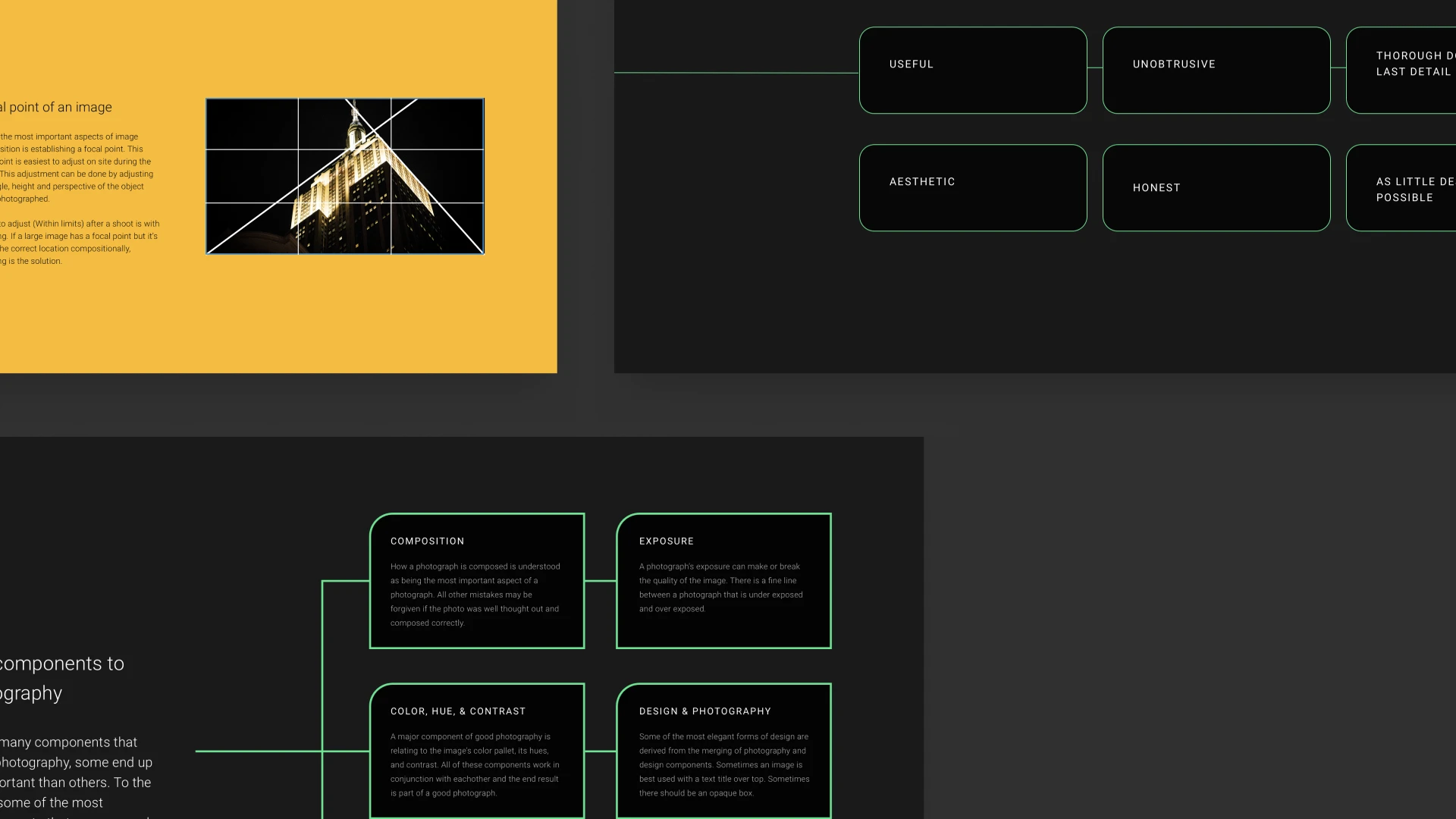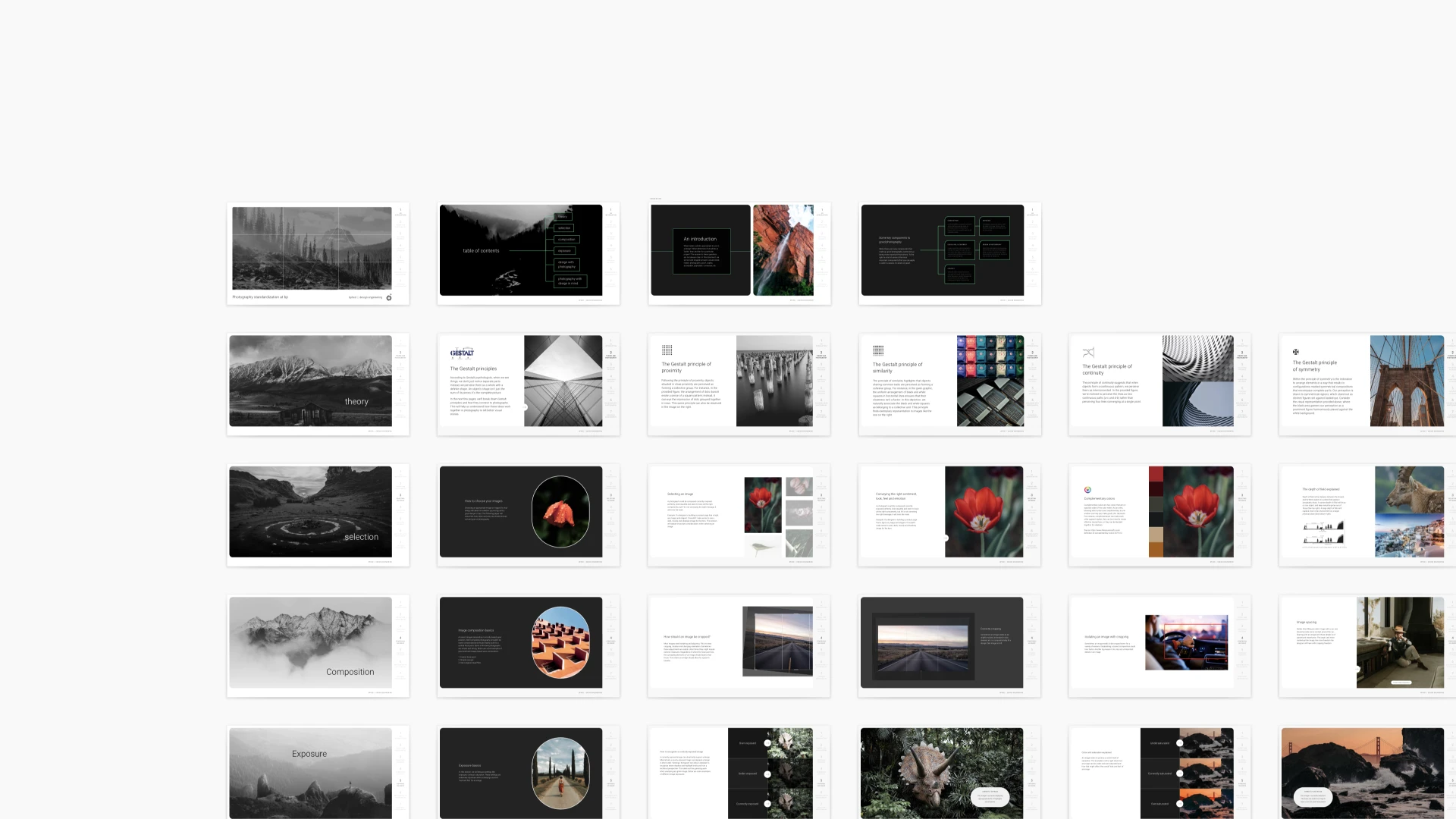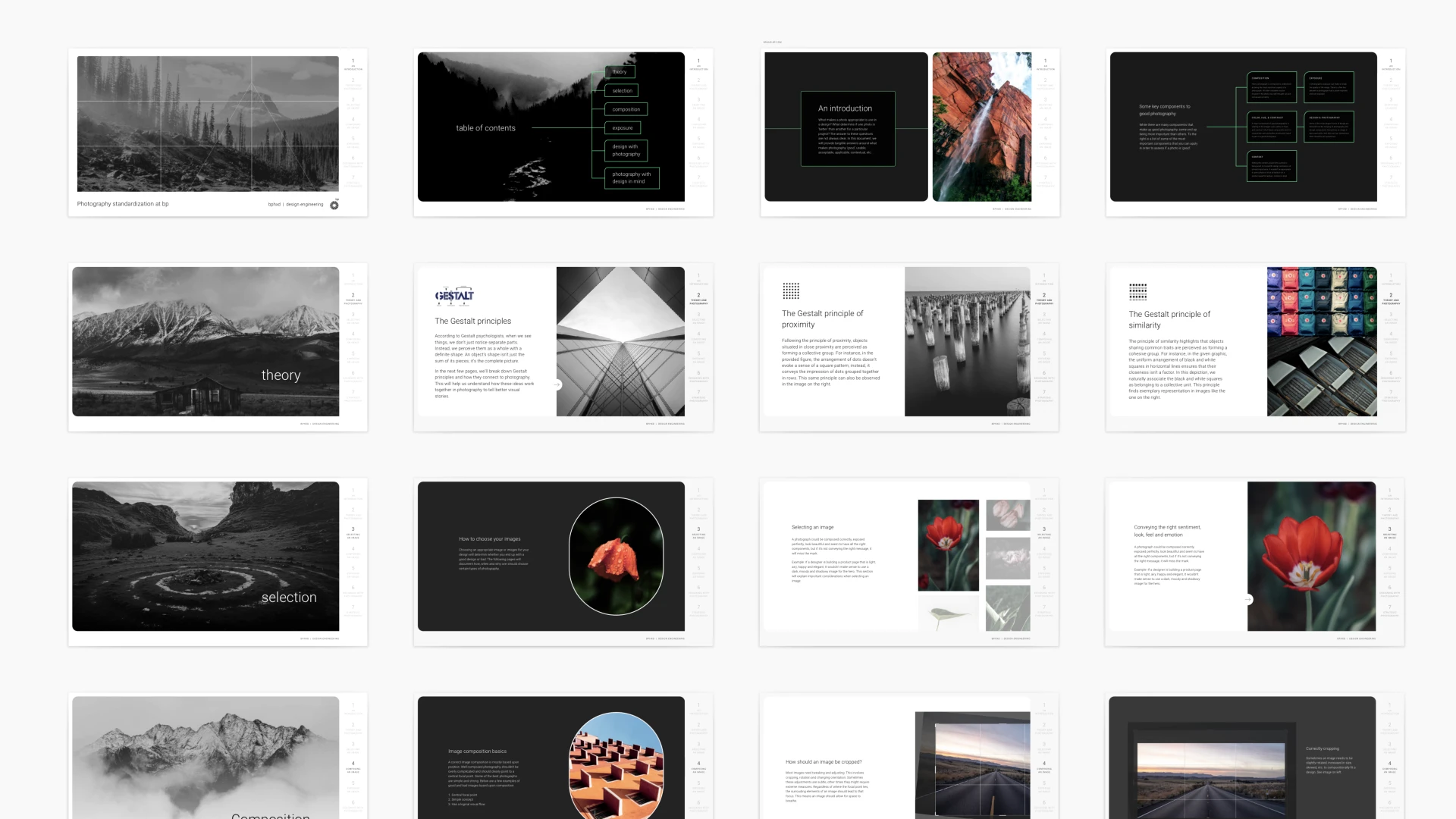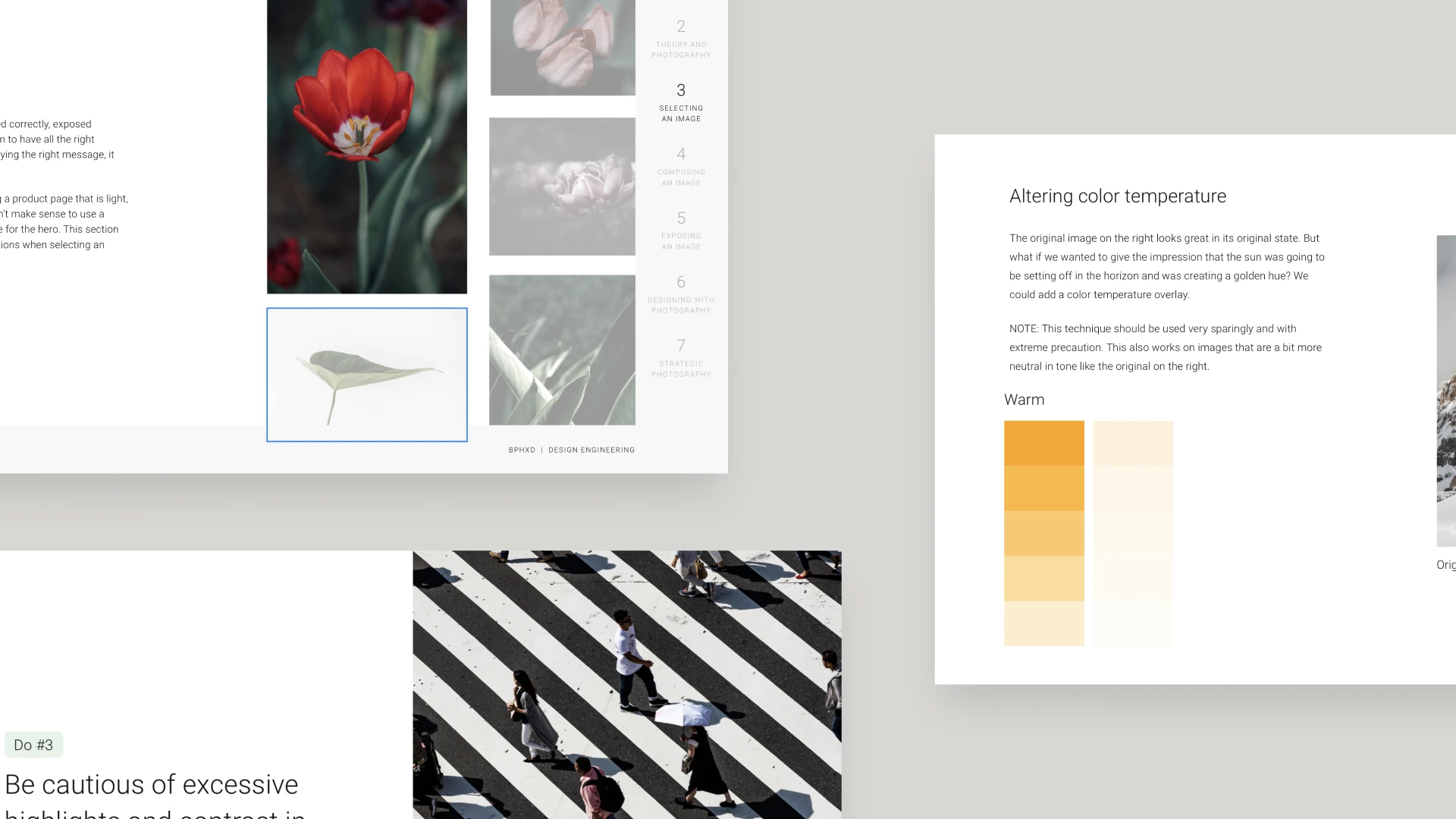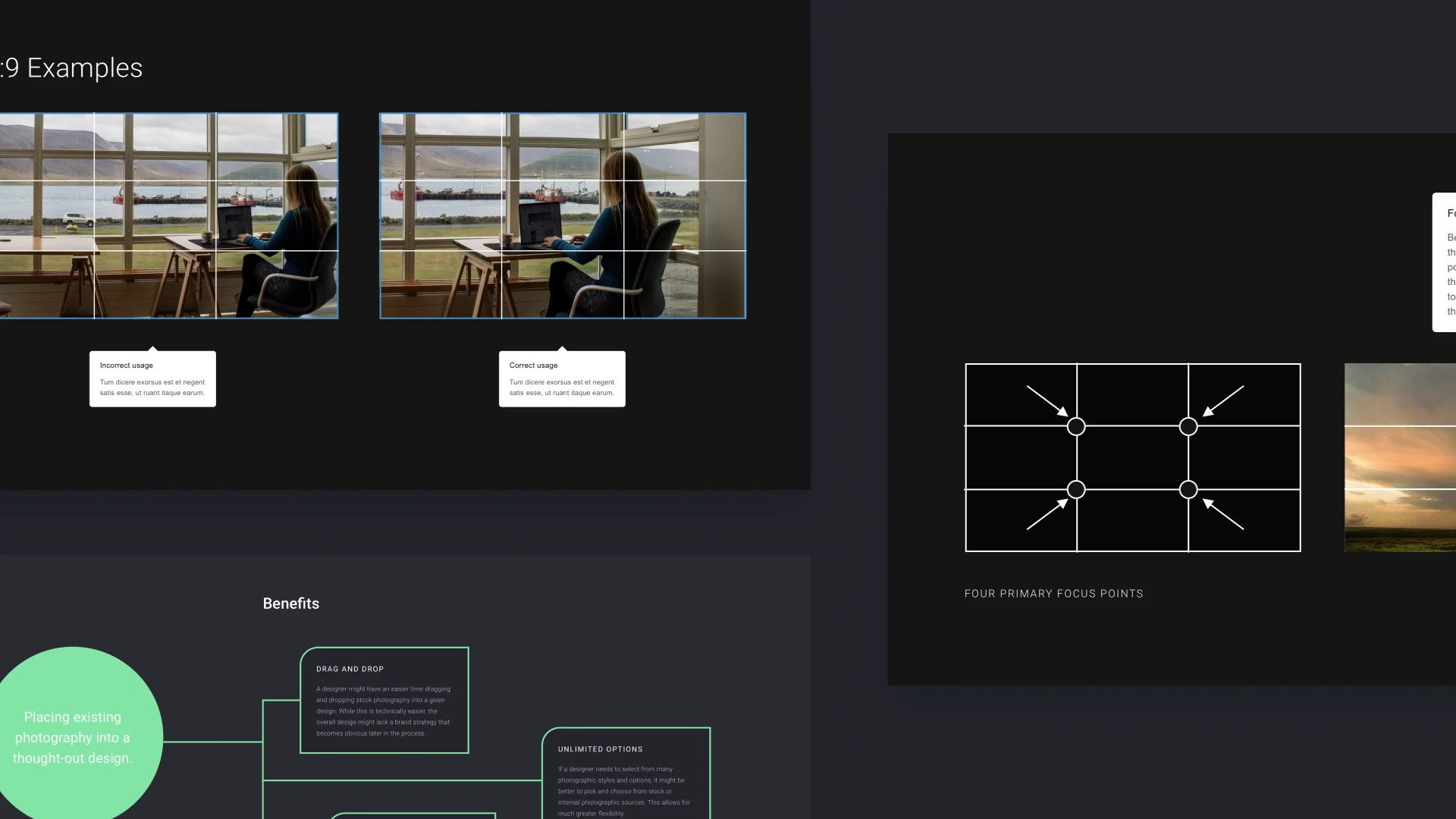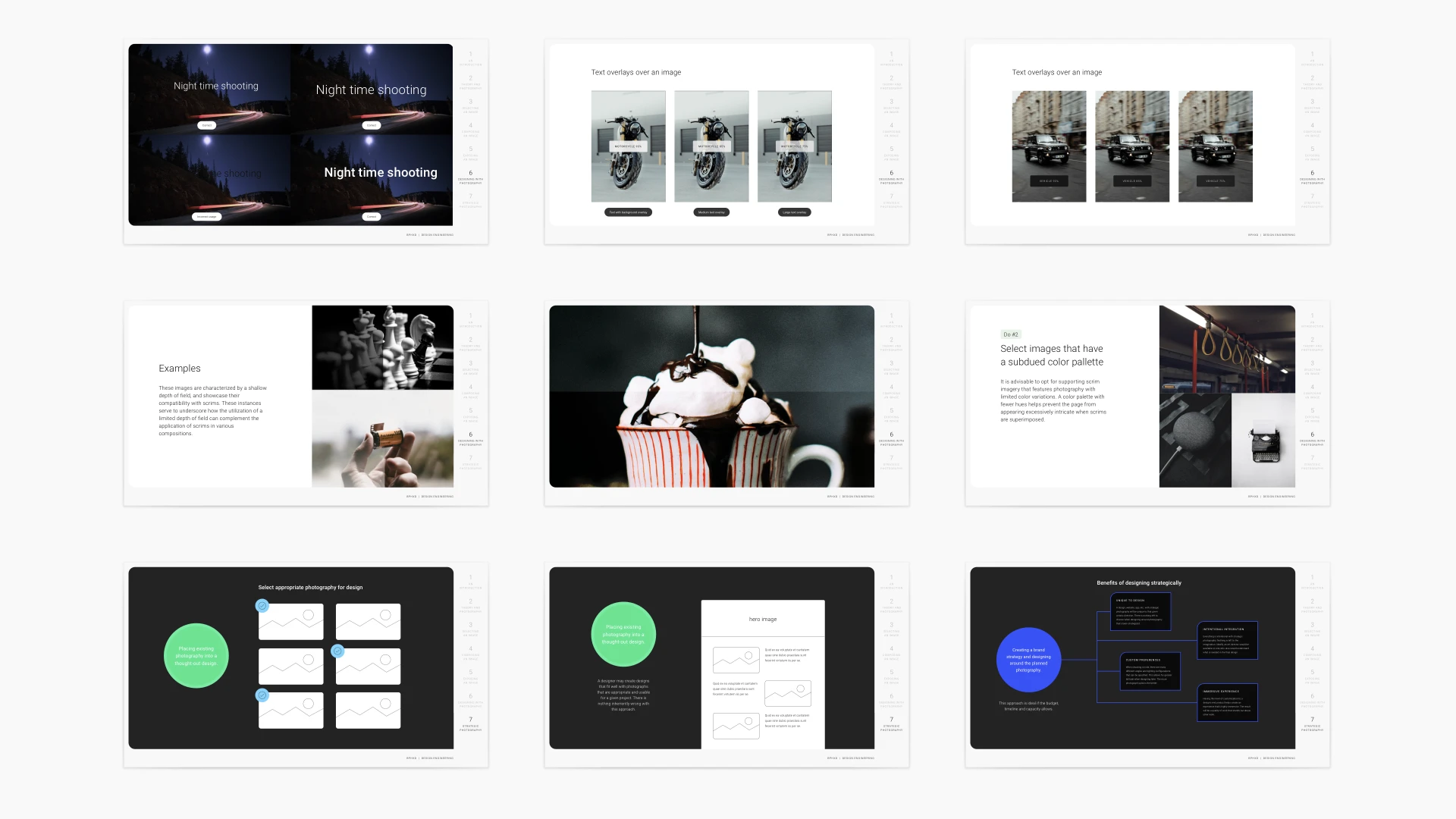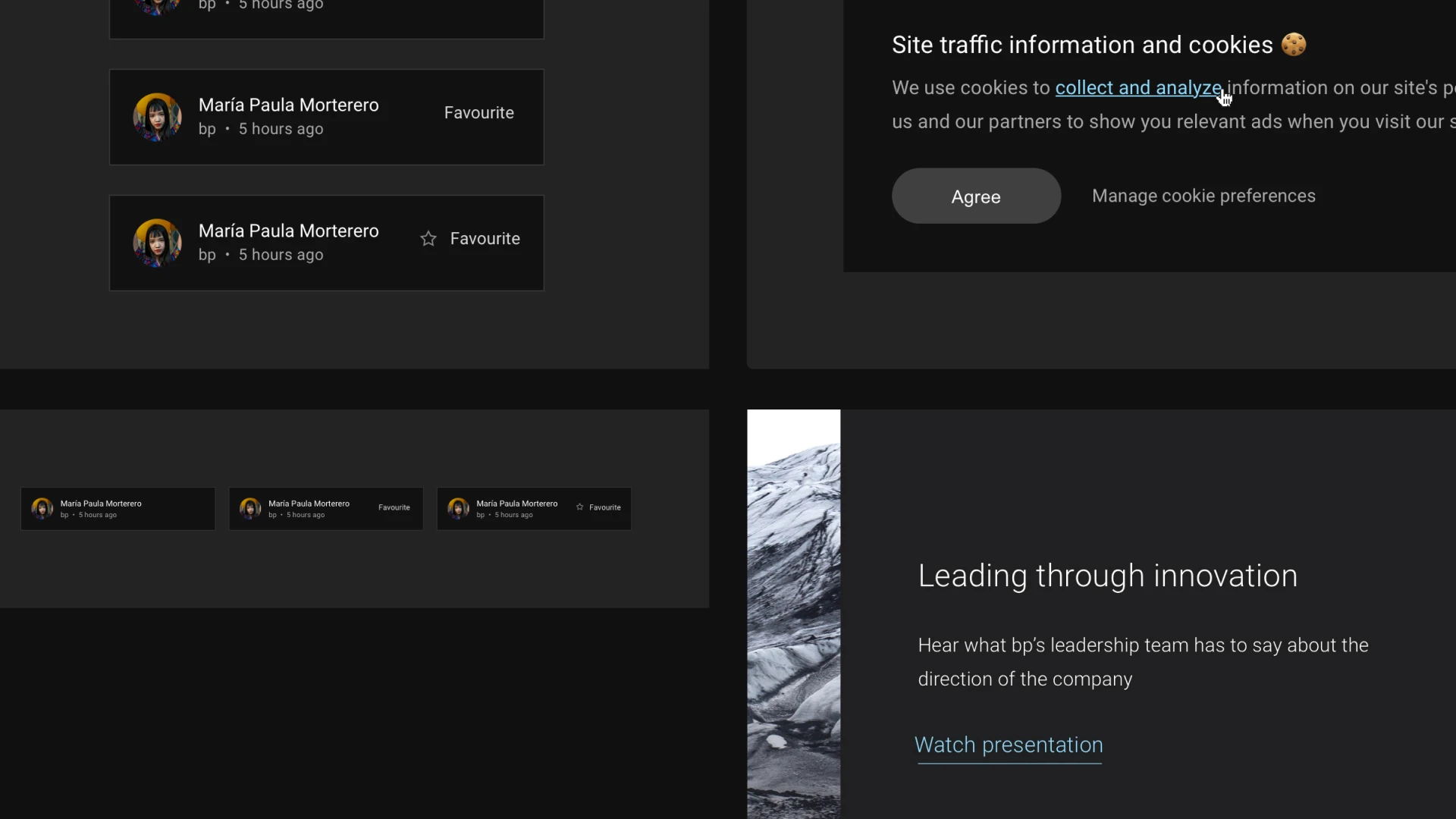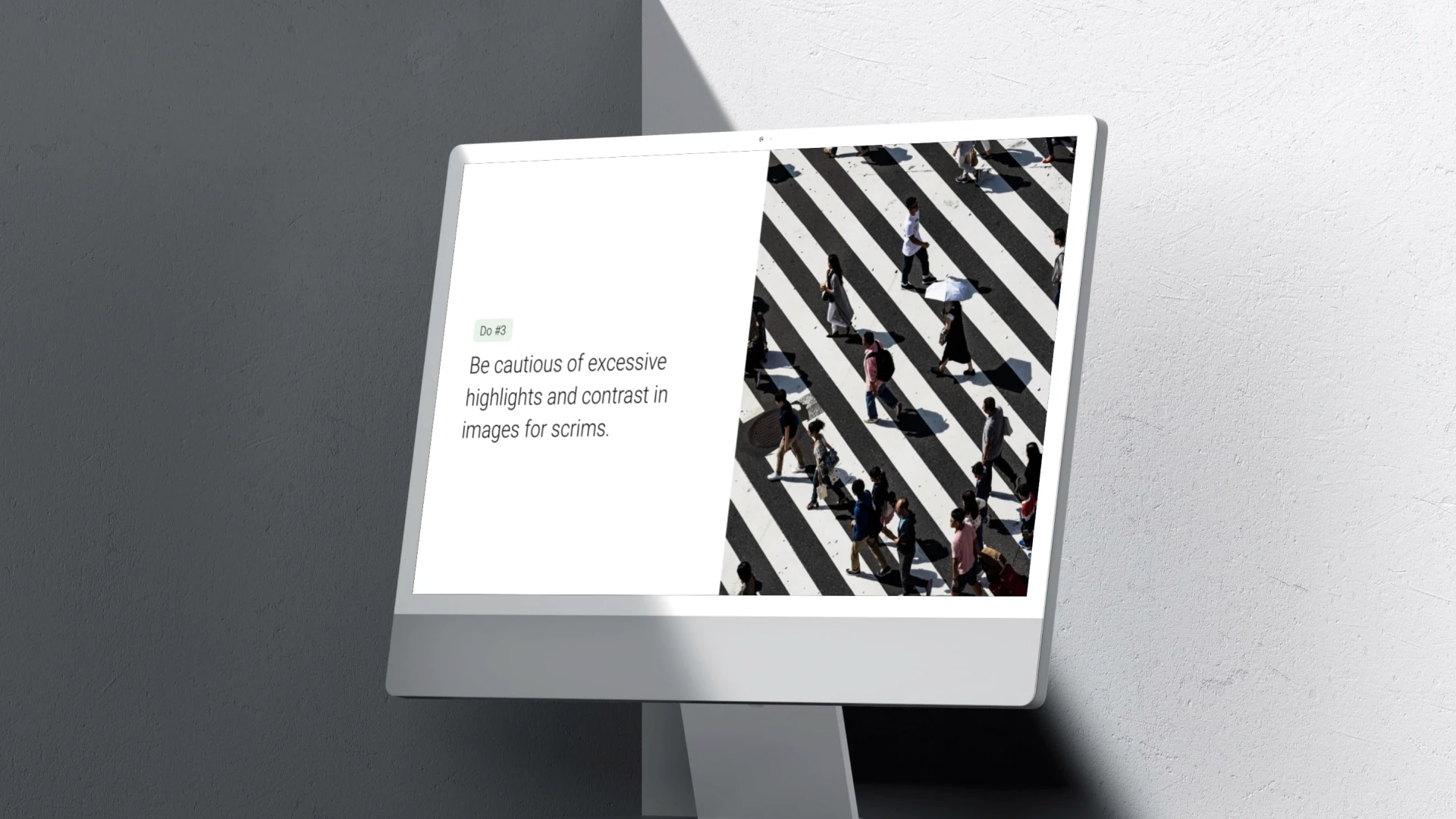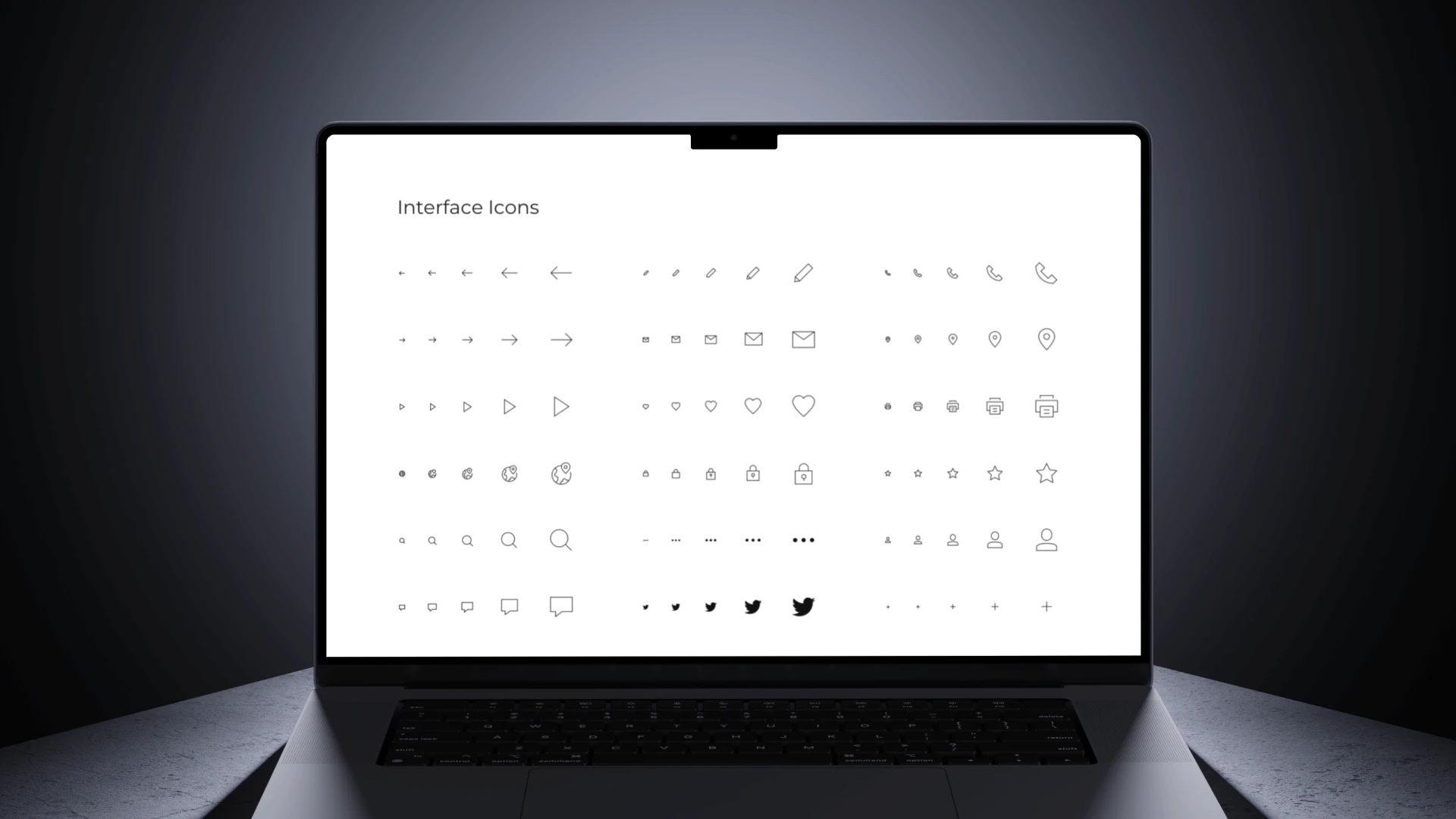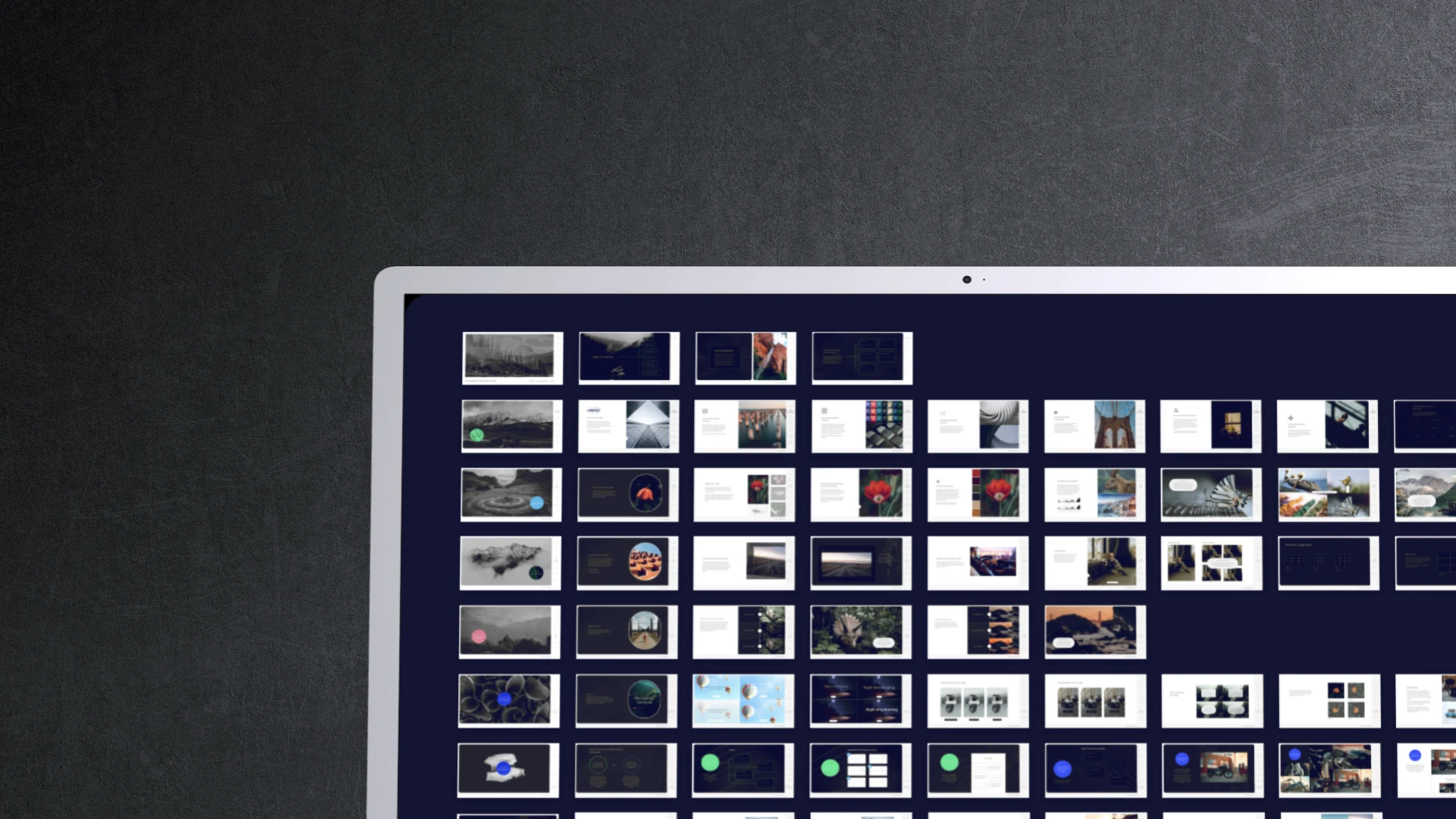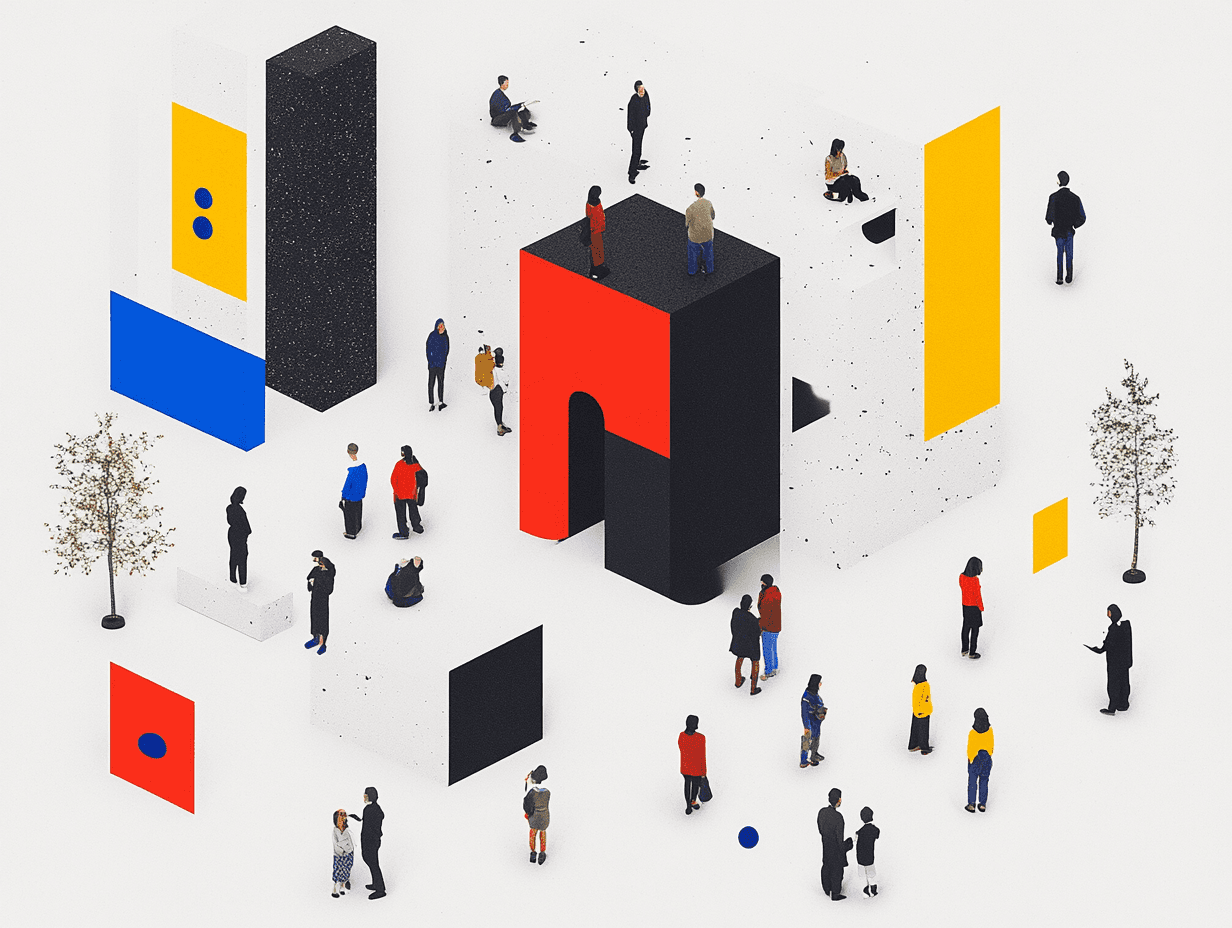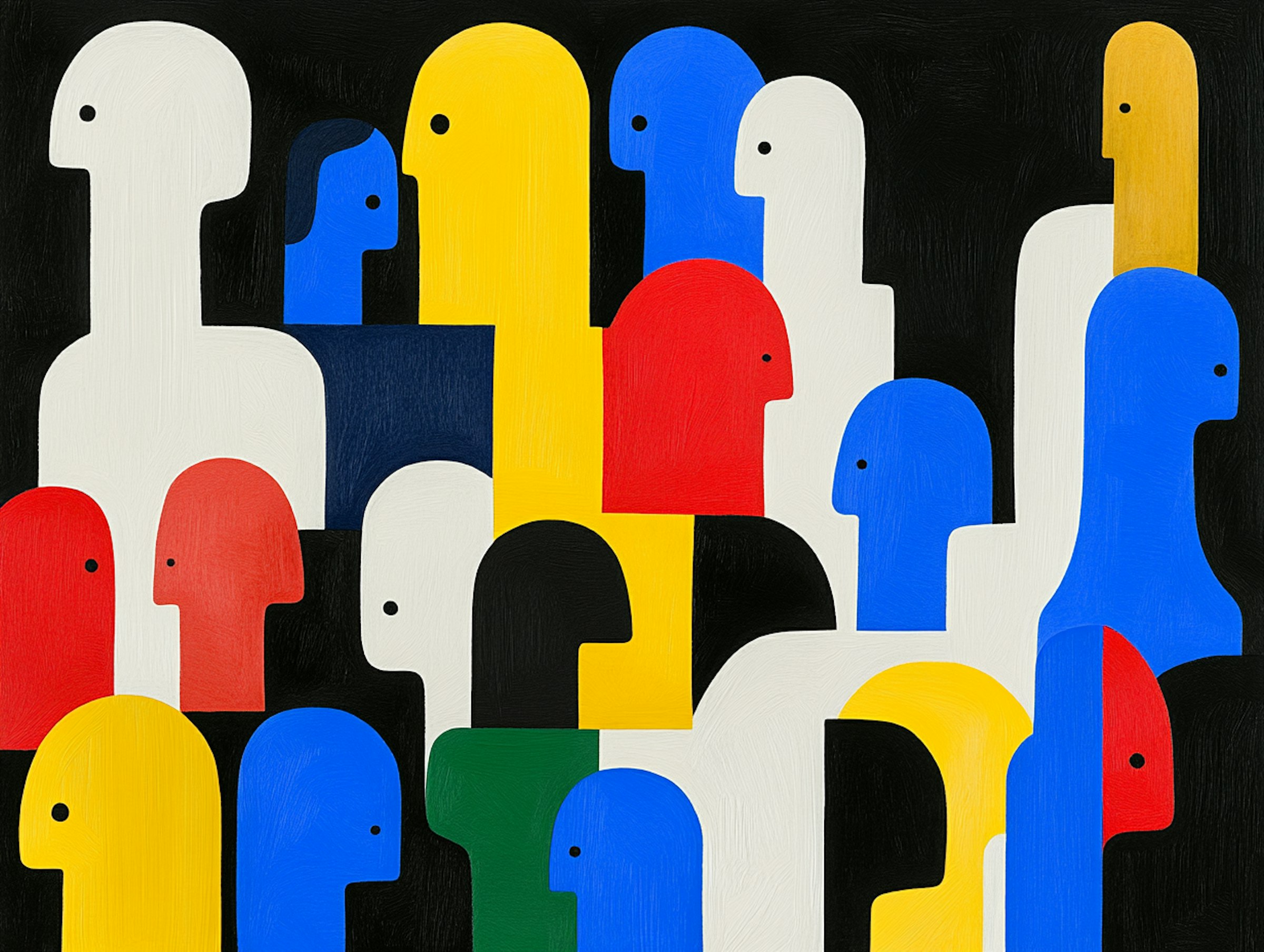





Design Engineer
Agency consultant
2020-2023
Design engineering
01
App design
02
Design systems
03
B2C
04
Ux Product Design
05
Project Overview
1
Solutions
Standardized BP's photography guidelines globally.
2
Consistency
Overcame resistance in a 600-designer team.
3
Research
Created a comprehensive framework for visual assets.
4
Feedback
Conducted 25+ workshops and 15+ feedback sessions.
5
Engagement
Achieved 30% adoption, with ongoing advocacy efforts.
Intro
BP's design engineering department needed standardized photography & iconography guidelines among other design systems support to enhance consistency.
Intro
BP's design engineering department needed standardized photography & iconography guidelines among other design systems support to enhance consistency.
Intro
BP's design engineering department needed standardized photography & iconography guidelines among other design systems support to enhance consistency.


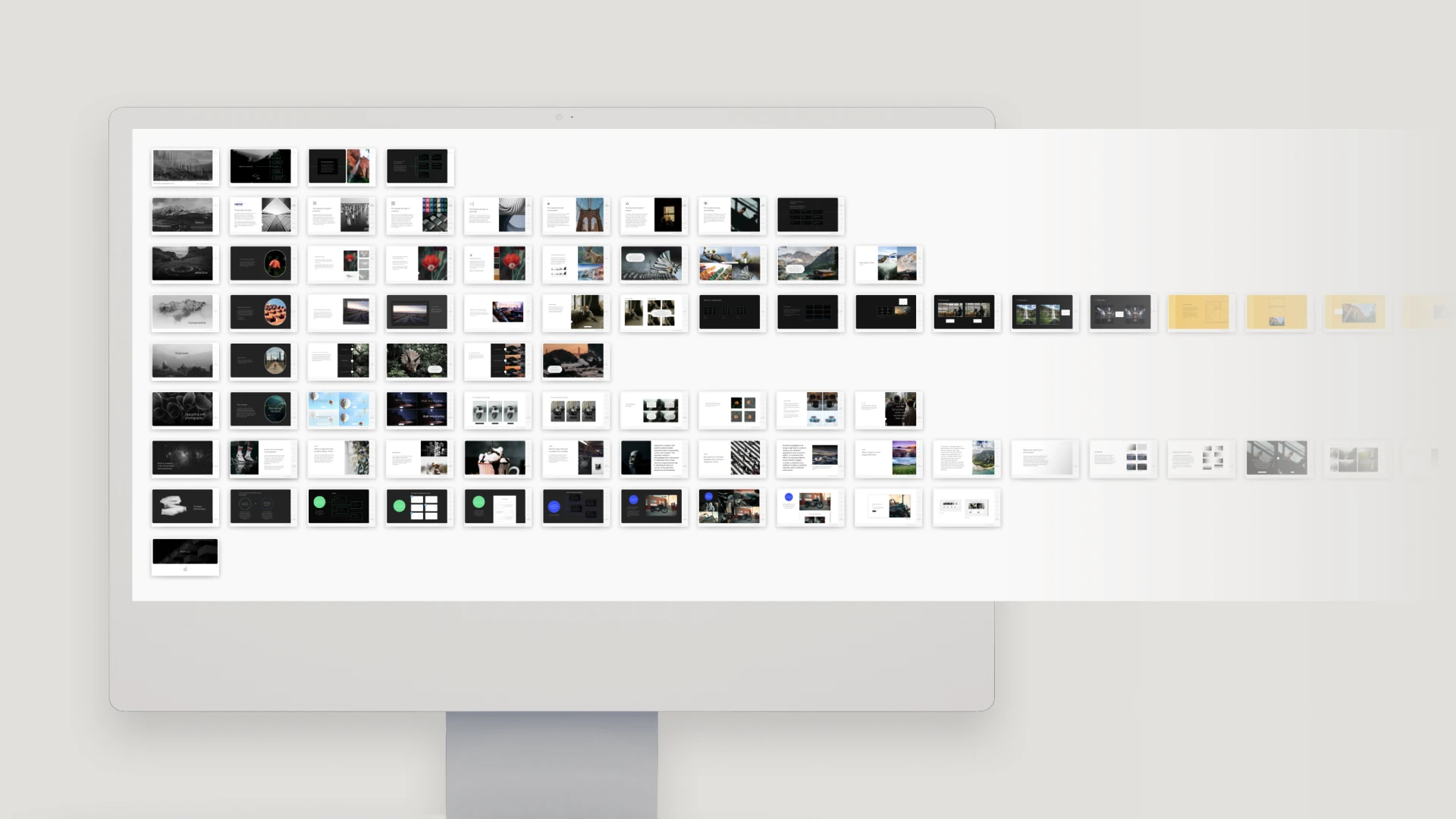

The Situation
BP needed a unified approach to photography to standardize visual assets across a team of 600 designers. The challenge was managing resistance to change and navigating complex organizational dynamics while promoting visual coherence and aligning with BP’s brand values.
The Situation
BP needed a unified approach to photography to standardize visual assets across a team of 600 designers. The challenge was managing resistance to change and navigating complex organizational dynamics while promoting visual coherence and aligning with BP’s brand values.
The Situation
BP needed a unified approach to photography to standardize visual assets across a team of 600 designers. The challenge was managing resistance to change and navigating complex organizational dynamics while promoting visual coherence and aligning with BP’s brand values.


Standardizing visual assets
The primary challenge was implementing comprehensive photography guidelines within BP’s large design engineering department. The initiative aimed to standardize visual assets but faced significant obstacles, including resistance to change and organizational complexity.
With a team of approximately 600 designers, achieving buy-in for new standards required navigating entrenched habits and varying opinions. The project sought to create a unified approach to photography, promoting visual coherence and enhancing the effectiveness of digital communication.
Managing differing perspectives and fostering a cultural shift towards consistency were critical to the success of this standardization effort, which was essential for aligning BP’s visual assets with its brand values.
We were navigating uncharted territory, trying to unify a diverse group under a single visual standard. It wasn’t just about creating guidelines; it was about fostering a cultural shift towards consistency in design.
Standardizing visual assets
The primary challenge was implementing comprehensive photography guidelines within BP’s large design engineering department. The initiative aimed to standardize visual assets but faced significant obstacles, including resistance to change and organizational complexity.
With a team of approximately 600 designers, achieving buy-in for new standards required navigating entrenched habits and varying opinions. The project sought to create a unified approach to photography, promoting visual coherence and enhancing the effectiveness of digital communication.
Managing differing perspectives and fostering a cultural shift towards consistency were critical to the success of this standardization effort, which was essential for aligning BP’s visual assets with its brand values.
We were navigating uncharted territory, trying to unify a diverse group under a single visual standard. It wasn’t just about creating guidelines; it was about fostering a cultural shift towards consistency in design.
Standardizing visual assets
The primary challenge was implementing comprehensive photography guidelines within BP’s large design engineering department. The initiative aimed to standardize visual assets but faced significant obstacles, including resistance to change and organizational complexity.
With a team of approximately 600 designers, achieving buy-in for new standards required navigating entrenched habits and varying opinions. The project sought to create a unified approach to photography, promoting visual coherence and enhancing the effectiveness of digital communication.
Managing differing perspectives and fostering a cultural shift towards consistency were critical to the success of this standardization effort, which was essential for aligning BP’s visual assets with its brand values.
We were navigating uncharted territory, trying to unify a diverse group under a single visual standard. It wasn’t just about creating guidelines; it was about fostering a cultural shift towards consistency in design.
The Task
The task was to develop and implement a comprehensive set of photography guidelines that would be adopted across BP’s design engineering department. This required research into existing practices, advocacy for change, and educational efforts to ensure alignment with BP’s brand vision.
The Task
The task was to develop and implement a comprehensive set of photography guidelines that would be adopted across BP’s design engineering department. This required research into existing practices, advocacy for change, and educational efforts to ensure alignment with BP’s brand vision.
The Task
The task was to develop and implement a comprehensive set of photography guidelines that would be adopted across BP’s design engineering department. This required research into existing practices, advocacy for change, and educational efforts to ensure alignment with BP’s brand vision.


Developing guidelines
The main task was to create a structured framework for photography & icons that would be adopted department-wide. This involved extensive research into existing practices and identifying areas needing standardization, including shot selection, cropping, exposure, and composition.
We proposed a comprehensive set of guidelines to improve BP’s visual storytelling. Despite the complexity of organizational dynamics and resistance to change, the task required ongoing advocacy, leadership support, and effective communication to ensure alignment with BP’s brand vision and standards.
Educational efforts were crucial to convey the importance of these guidelines and achieve widespread adoption among designers with varying levels of familiarity.
Creating these guidelines wasn’t just a design task; it was a mission to elevate our visual communication. We needed to convince a diverse team of the value in standardization while respecting individual creativity.
Developing guidelines
The main task was to create a structured framework for photography & icons that would be adopted department-wide. This involved extensive research into existing practices and identifying areas needing standardization, including shot selection, cropping, exposure, and composition.
We proposed a comprehensive set of guidelines to improve BP’s visual storytelling. Despite the complexity of organizational dynamics and resistance to change, the task required ongoing advocacy, leadership support, and effective communication to ensure alignment with BP’s brand vision and standards.
Educational efforts were crucial to convey the importance of these guidelines and achieve widespread adoption among designers with varying levels of familiarity.
Creating these guidelines wasn’t just a design task; it was a mission to elevate our visual communication. We needed to convince a diverse team of the value in standardization while respecting individual creativity.
Developing guidelines
The main task was to create a structured framework for photography & icons that would be adopted department-wide. This involved extensive research into existing practices and identifying areas needing standardization, including shot selection, cropping, exposure, and composition.
We proposed a comprehensive set of guidelines to improve BP’s visual storytelling. Despite the complexity of organizational dynamics and resistance to change, the task required ongoing advocacy, leadership support, and effective communication to ensure alignment with BP’s brand vision and standards.
Educational efforts were crucial to convey the importance of these guidelines and achieve widespread adoption among designers with varying levels of familiarity.
Creating these guidelines wasn’t just a design task; it was a mission to elevate our visual communication. We needed to convince a diverse team of the value in standardization while respecting individual creativity.
Taking Action
We created a structured framework for photography, collaborating closely with leadership and designers. Despite resistance, we implemented the guidelines through ongoing advocacy, workflow improvements, and fostering a cultural shift towards consistency in visual communication.
Taking Action
We created a structured framework for photography, collaborating closely with leadership and designers. Despite resistance, we implemented the guidelines through ongoing advocacy, workflow improvements, and fostering a cultural shift towards consistency in visual communication.
Taking Action
We created a structured framework for photography, collaborating closely with leadership and designers. Despite resistance, we implemented the guidelines through ongoing advocacy, workflow improvements, and fostering a cultural shift towards consistency in visual communication.


Implementing the framework
The development of the photography & icon guidelines resulted in a structured framework designed to elevate design standards and promote visual coherence within BP. Despite challenges in achieving universal adoption, the guidelines provided a clear roadmap for incorporating photography & iconography into the design processes.
The project involved continuous collaboration with leadership and designers to address resistance and align with BP’s brand vision. By streamlining workflows and improving visual communication, the guidelines aimed to enhance the effectiveness of digital assets and support BP’s broader design objectives.
The structured approach and commitment to embedding these standards reflect a dedication to long-term success and design excellence within BP’s operations.
Implementing the guidelines required continuous dialogue and collaboration. It wasn’t just about setting rules but about creating a shared vision that everyone could stand behind.
Implementing the framework
The development of the photography & icon guidelines resulted in a structured framework designed to elevate design standards and promote visual coherence within BP. Despite challenges in achieving universal adoption, the guidelines provided a clear roadmap for incorporating photography & iconography into the design processes.
The project involved continuous collaboration with leadership and designers to address resistance and align with BP’s brand vision. By streamlining workflows and improving visual communication, the guidelines aimed to enhance the effectiveness of digital assets and support BP’s broader design objectives.
The structured approach and commitment to embedding these standards reflect a dedication to long-term success and design excellence within BP’s operations.
Implementing the guidelines required continuous dialogue and collaboration. It wasn’t just about setting rules but about creating a shared vision that everyone could stand behind.
Implementing the framework
The development of the photography & icon guidelines resulted in a structured framework designed to elevate design standards and promote visual coherence within BP. Despite challenges in achieving universal adoption, the guidelines provided a clear roadmap for incorporating photography & iconography into the design processes.
The project involved continuous collaboration with leadership and designers to address resistance and align with BP’s brand vision. By streamlining workflows and improving visual communication, the guidelines aimed to enhance the effectiveness of digital assets and support BP’s broader design objectives.
The structured approach and commitment to embedding these standards reflect a dedication to long-term success and design excellence within BP’s operations.
Implementing the guidelines required continuous dialogue and collaboration. It wasn’t just about setting rules but about creating a shared vision that everyone could stand behind.
Results
The guidelines significantly improved visual consistency within BP, although widespread adoption is ongoing. The project highlighted the challenges of standardizing practices in a large organization but made crucial strides in aligning visual assets with BP’s brand identity.
Results
The guidelines significantly improved visual consistency within BP, although widespread adoption is ongoing. The project highlighted the challenges of standardizing practices in a large organization but made crucial strides in aligning visual assets with BP’s brand identity.
Results
The guidelines significantly improved visual consistency within BP, although widespread adoption is ongoing. The project highlighted the challenges of standardizing practices in a large organization but made crucial strides in aligning visual assets with BP’s brand identity.
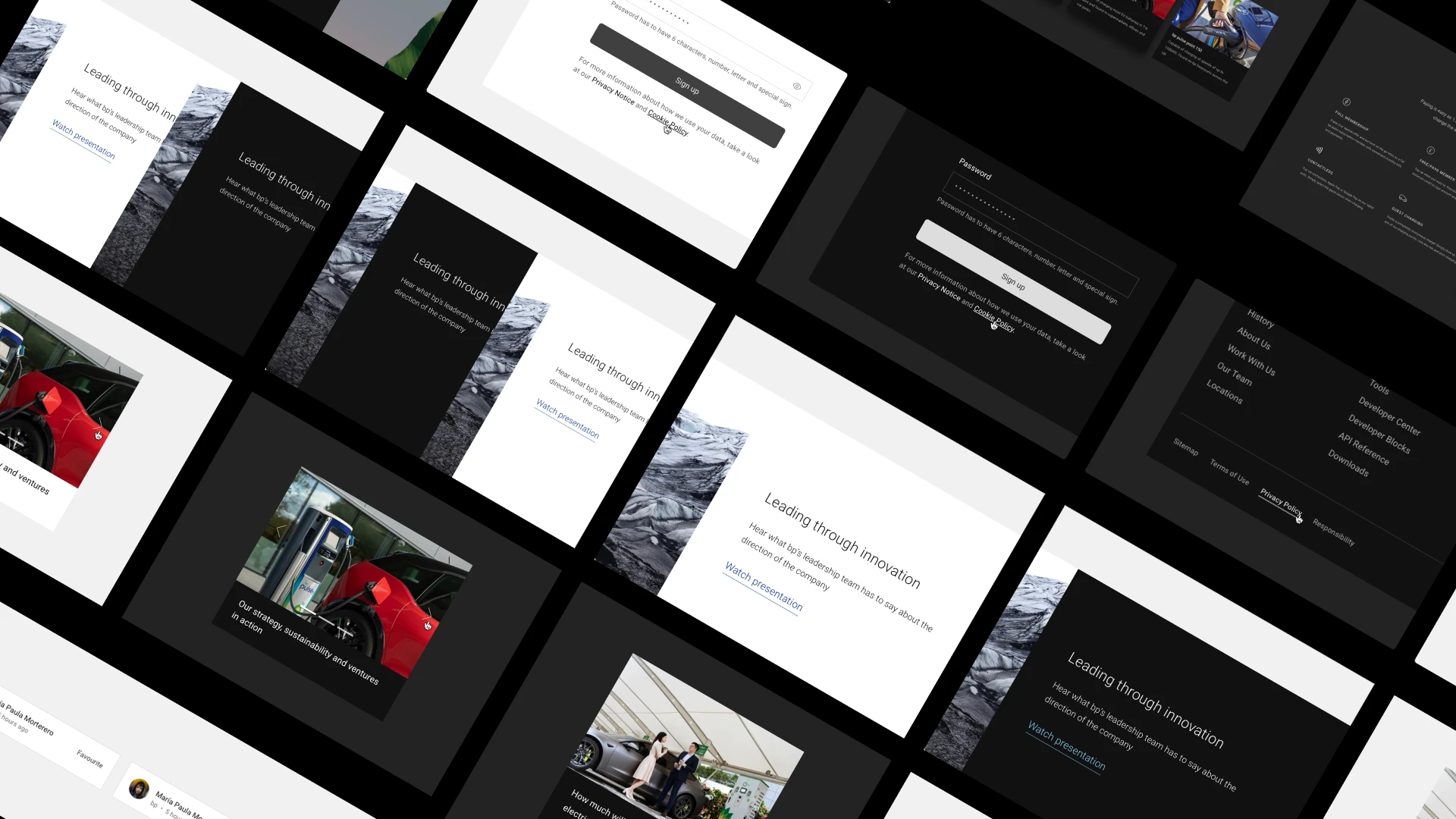

We Tracked the Product Post-Launch
Monitoring the progress of the photography and iconography guidelines project involved tracking key metrics related to adoption, communication, and impact. Despite significant efforts, challenges such as resistance to change and varying stakeholder perspectives persisted.
Metrics were used to gauge the effectiveness of the guidelines, including designer engagement, feedback on usability, and the overall impact on visual coherence and brand consistency. Ongoing efforts to address challenges and refine the approach were essential for achieving the project’s goals.
We Tracked the Product Post-Launch
Monitoring the progress of the photography and iconography guidelines project involved tracking key metrics related to adoption, communication, and impact. Despite significant efforts, challenges such as resistance to change and varying stakeholder perspectives persisted.
Metrics were used to gauge the effectiveness of the guidelines, including designer engagement, feedback on usability, and the overall impact on visual coherence and brand consistency. Ongoing efforts to address challenges and refine the approach were essential for achieving the project’s goals.
4
Workshops conducted
2
Guidelines drafted
6+
Feedback sessions held
TBD
Adoption rate
100+
Resource pages developed
200+
Icons created
Achievements and ongoing efforts
The finalized photography guidelines and iconography output represented a significant achievement in standardizing visual assets within BP. The comprehensive framework addressed various aspects of photography, providing a valuable resource for designers.
However, achieving widespread adoption remains a work in progress. The challenges of implementing standardized guidelines across a large, diverse organization have proven substantial. Overcoming resistance and aligning individual preferences with collective objectives are ongoing efforts.
Despite these challenges, the project has made notable strides towards improving visual consistency and brand coherence. The ongoing commitment to promoting and embedding these guidelines signifies a dedication to achieving long-term success and design excellence within BP.
The journey wasn’t easy, but we made meaningful progress. The guidelines are now a cornerstone of our design process, and while adoption is still growing, we’re on the right path.
Achievements and ongoing efforts
The finalized photography guidelines and iconography output represented a significant achievement in standardizing visual assets within BP. The comprehensive framework addressed various aspects of photography, providing a valuable resource for designers.
However, achieving widespread adoption remains a work in progress. The challenges of implementing standardized guidelines across a large, diverse organization have proven substantial. Overcoming resistance and aligning individual preferences with collective objectives are ongoing efforts.
Despite these challenges, the project has made notable strides towards improving visual consistency and brand coherence. The ongoing commitment to promoting and embedding these guidelines signifies a dedication to achieving long-term success and design excellence within BP.
The journey wasn’t easy, but we made meaningful progress. The guidelines are now a cornerstone of our design process, and while adoption is still growing, we’re on the right path.
Achievements and ongoing efforts
The finalized photography guidelines and iconography output represented a significant achievement in standardizing visual assets within BP. The comprehensive framework addressed various aspects of photography, providing a valuable resource for designers.
However, achieving widespread adoption remains a work in progress. The challenges of implementing standardized guidelines across a large, diverse organization have proven substantial. Overcoming resistance and aligning individual preferences with collective objectives are ongoing efforts.
Despite these challenges, the project has made notable strides towards improving visual consistency and brand coherence. The ongoing commitment to promoting and embedding these guidelines signifies a dedication to achieving long-term success and design excellence within BP.
